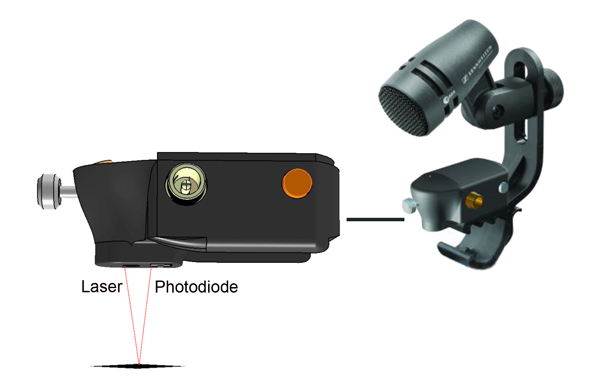 Talk about hi-tech, what if you had lasers controlling your mics? That's exactly what Sennheiser is proposing with their e904 and e604 clip-on mics.
Talk about hi-tech, what if you had lasers controlling your mics? That's exactly what Sennheiser is proposing with their e904 and e604 clip-on mics.Actually, the laser mic is a misnomer. It's actually a laser mic clip that's the innovative piece.
Everyone knows that leakage into drum mics, even from other drums in the kit, is something that we'd like to get rid of in many situations to clean up a mix. By placing a laser and a sensor in the mic clip, the laser can then precisely measure when the drum head is struck and open up a noise gate, so what you're actually hearing is a laser-controlled mic (we'll get to those real "laser mics" someday soon, as this is the just a glimpse into the future).
The laser drum clips are still in the prototype stage, so there's no pricing yet, but you can see and hear how well they work in this video.
A big shout-out to my buddy Frank Coleman for the heads up on this.
----------------------------------
You should follow me on Twitter for daily news and updates on production and the music business.
Don't forget to check out my Music 3.0 blog for tips and tricks on navigating social media and the new music business.


5 comments:
This is amazing
Bobby,
If you haven't played with Drumagog yet, it essentially does the same thing for cheap and is available NOW! I use it now fairly extensively, and it's just amazing.
It's drum replacement, which for budget projects, or the inexperienced basically means that you are going to get amazing sound from even cheap kits. In my last round of recordings, I used a bunch of cheap mismatched dynamic mic's and a US-800 tascam interface. It doesn't get more bargain barrel than that.
Using Drumagog as a track plugin and some simple sensitivity automation for the plugin on each track (this is the equivalent of a gate) I was able to get PERFECTLY isolated drums.
If you'll notice in the video that there is still some bleed-through when the gates open. I mention that because again, in my project, the drums were perfectly isolated.
You can hear the project here: https://soundcloud.com/eric-marshall-schoonmaker/epic-danger
I really think that your audience would do well to know about Drumagog, because the lasers are awesome and really good for the higher end studios, but the small-fry's like me can seriously kick some ass on a budget with this.
BTE, I just picked up a copy of the Studio musicians Handbook, and I love it. Nothing but the best from you, as always!
Eric Marshall Schoonmaker
Ok, but the over still need a high pass and a normal gate.
Very interesting though. The video is not so good in my opinion (in term of videomaking). But the laser mic it's a great thing.
Thanks for the post Bobby! Eric, the laser detector is similar to Drumagog and other drum replacement software but it is still different. In fact, someone that uses drum replacement will benefit much more from the laser detector. Drum replacement uses a signal follower that is similar to that of a gate / compressor but it is used to trigger samples, not to process the incoming audio. If you have a false trigger on a gate, you get a little bit of bleed from a neighboring drum. However, if you have a false trigger with drum replacement, your tom hit becomes a snare hit, which could cause significant problems :-)
Gian, I'm glad you like the idea but I should apologize for the video. It was done in 2 days and was never really intended to be shown to the public. It was really just an internal marketing tool to get buy-in from our product guys. Unfortunately, it worked well enough that it's now public :-) Also, are you suggesting to gate the overheads? I did not consider that as a use case since I've never heard of anyone doing that before.
Thanks for the input everyone! Also, Bobby, fantastic blog. Drop us a line if you're ever up in San Fran and want to stop by the Sennheiser Research Office.
Andy Greenwood
Audio Innovation Engineer
Sennheiser Technology & Innovation
Hi Andy,
thank you so much for your kind reply! Ok for the video made in two days for internal use: that explain everything. The overhead: I don't want to gate them, just to EQ the with an high pass filter to cut low frequencies. I have recorded many live concerts in small clubs, and the overheads, usually capture "everything" unless you high pass them. I hope I am clear enough, thank you.
Post a Comment